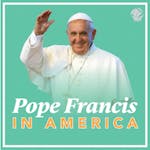
In his address to Congress today, Pope Francis organized his thoughts around four historically meaningful Americans who dedicated their lives to some form of service: President Abraham Lincoln, Dr. Martin Luther King Jr., Dorothy Day, and Thomas Merton.
The selection is, in many ways, characteristic of all of Pope Francis’s hopes for inclusion. By including a woman and an African American, he signaled that the history of the United States cannot be summed up with the usual blur of white, male presidential faces—though those faces, too, are a part of our history. He also chose people of faith, but people of varied faiths: Merton and Day were Catholics, but Lincoln and King were both Protestant. It is perhaps significant that half of the people Pope Francis selected were eventually assassinated for their efforts at improving the nation.
Francis’s choice of emblematic Americans tells us not only about his hopes for the future, but also about his diagnosis of our present circumstances. These figures echo problems that Francis has repeatedly identified as plaguing the world today—and how we might address them.
In Lincoln, who for Francis represents “liberty,” we find someone who, against the wishes of a vocal segment of his nation, liberated a battered minority from slavery. For Pope Francis, freedom is an important concept, but a complicated one, because it is not only legally recognized slavery that compromises our freedom. “Our freedom fades,” Francis writes in Laudato Si, “when it is handed over to the blind forces of the unconscious, of immediate needs, of self-interest, and of violence.” Since Francis's speech emphasized the violence plaguing the world as an immediate challenge, his selection of Lincoln may well signal his feeling that there is another kind of liberation in order if America is to prosper as a nation, one that will free us from what he termed a “hopeless maze of violence, abuse and despair.”
The Pope’s choice of Martin Luther King Jr. indicates an acknowledgement of the racial tension that currently strains communities in the United States. King, who represents to Francis “liberty in plurality and non-exclusion,” helped to usher in an era in which freedom is imagined in its fullest capacity, one which recognizes the right of all persons to participate in the life of society. King’s dream, which Francis described as “full civil and political rights for African Americans,” is alive today but unfinished. Pope Francis’s reference helps to underscore the degree to which we still have plenty to accomplish in the categories of social inclusion and racial animosity. In King, Francis sees “action, to participation, to commitment,” a trio of values that echo the grassroots anti-racist movements currently sweeping the nation.
Dorothy Day, whose life’s work included the founding of the Catholic Worker Movement, devoted herself fully to achieving rights for the poor, homeless, and battered underclasses. In Day, whose “social activism, her passion for justice and for the cause of the oppressed, were inspired by the Gospel, her faith, and the example of the saints,” the pontiff sees an exemplary commitment to “social justice and the rights of persons.” Needless to say, his selection of Day suggests his ongoing concern with the conditions of working people in the United States and worldwide; in his address to America, he sought to dialogue with “thousands of men and women who strive each day to do an honest day’s work, to bring home their daily bread, to save money”—not strictly with the rich and powerful who sat directly before him. In other words, Francis’s interest in Day suggests his ongoing wish to see a more just distribution of wealth, with dignified conditions and protections for working people.
And then there's Thomas Merton, a Trappist monk who lived in the Abbey of Gethsemani in Kentucky and passed away in 1968. Merton’s books on spirituality, non-violence, equality and justice are deeply appreciated by Catholics today, in much part thanks to their moving exploration of relating to God. In an era Francis has described as being swept by a “tide of secularism,” it is no surprise that the pontiff would settle on such an intensely spiritual figure in his address to the nation’s leaders. While Lincoln, King, and Day each had their hand in reforming some of society’s most abject material privations, Merton had a hand in reviving a spiritual ascendancy in times marked by alienation, cynicism, and despair. Francis’s placement of Merton in the American pantheon therefore implies the Pope’s desire to see a spiritual revival, not just a political reversal or social revolution.
In all, Pope Francis’s A-team of Americans does a good job of encompassing his hopes for the nation at large. And, though none of these figures are particularly popular with the nation’s rightward fringe, it seems there is something in them for everyone, from activism to contemplation, from freedom to submission to God. And perhaps encompassing these paradoxes is one of Francis’s greatest gifts.
